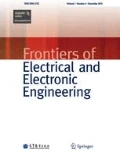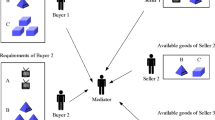Abstract
This paper demonstrates the potential role of autonomous agents in economic theory. We first dispatch autonomous agents, built by genetic programming, to double auction markets. We then study the bargaining strategies, discovered by them, and from there, an autonomous-agent-inspired economic theory with regard to the optimal procrastination is derived.
Similar content being viewed by others
References
Tesfatsion L, Judd K. Handbook of Computational Economics, Volume 2: Agent-Based Computational Economics. Amsterdam: North Holland, 2006
Chen S H. Computational intelligence in agent-based computational economics. In: Fulcher J, Jain L, eds. Computational Intelligence: A Compendium. Springer, 2008, 115: 517–594
Chen S H. Genetic programming and agent-based computational economics: from autonomous agents to product innovation. In: Terano T, Kita H, Takahashi S, Deguchi H, eds. Agent-Based Approaches in Economic and Social Complex Systems, 2009, 6: 3–14
Rust J, Miller J, Palmer R. Behavior of trading automata in a computerized double auction market. In: Friedman D, Rust J, eds. Double Auction Markets: Theory, Institutions, and Laboratory Evidence, 1993: 155–198
Rust J, Miller J, Palmer R. Characterizing effective trading strategies: insights from a computerized double auction tournament. Journal of Economic Dynamics and Control, 1994, 18(1): 61–96
Chen S H, Tai C C. The agent-based double auction markets: 15 years on. In: Takadama K, Cioffi-Revilla C, and Deffuant G, eds. Simulating Interacting Agents and Social Phenomena: The Second World Congress, 2010, 7: 119–136
Andrews M, Prage R. Genetic programming for the acquisition of double auction market strategies. In: Kinnear K Jr, ed. Advances in Genetic Programming. Cambridge: MIT Press, 1994: 355–368
Thaler R. From Homo economicus to Homo sapiens. Journal of Economic Perspectives, 2000, 14(1): 133–141
Author information
Authors and Affiliations
Corresponding author
Additional information
Prof. Dr. Shu-Heng CHEN is a Distinguished Professor in the Department of Economics, Dean of Office of International Cooperation, Director of the AIECON Research Center, and the organizer of Experimental Economics Laboratory at Chengchi University. He also serves as Vice Chair of the IEEE Computational Finance & Economics Technical Committee, the editor-in-chief of the Journal of New Mathematics and Natural Computation (World Scientific), and the associate editor of the Journal of Economic Behaviour and Organization and Journal of Economic Interaction and Coordination. Prof. CHEN holds an MA degree in mathematics and a Ph. D in Economics from University of California at Los Angeles. His current research interests include agent-based computational economics, computational intelligence, experimental economics, and computational and cognitive social sciences.
Tina YU is an associate professor in the Department of Computer Science at Memorial University of Newfoundland. Tina conducts research in machine learning, computational intelligence and applies them to a variety of areas such as energy, medicine and economics. She serves at the editorial board of a Springer journal Genetic Programming and Evolvable Machines and an MIT Press journal Evolutionary Computation.
About this article
Cite this article
Chen, SH., Yu, T. Agents learned, but do we? Knowledge discovery using the agent-based double auction markets. Front. Electr. Electron. Eng. China 6, 159–170 (2011). https://doi.org/10.1007/s11460-011-0132-4
Received:
Accepted:
Published:
Issue Date:
DOI: https://doi.org/10.1007/s11460-011-0132-4




